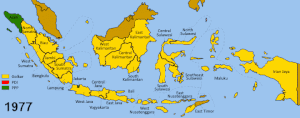 important changes.[2]
important changes.[2] Among these are term limits of up to two five-year terms for the President and Vice President, and measures to institute checks and balances. The highest state institution is the People's Consultative Assembly (MPR), whose functions previously included electing the president and vice president (since 2004 the president has been elected directly by the people), establishing broad guidelines of state policy, and amending the constitution. The 695-member MPR includes all 550 members of the People's Representative Council (DPR) (the House of Representatives) plus 130 "regional representatives" elected by the twenty-six provincial parliaments and sixty-five appointed members from societal groups[3]
The DPR, which is the premier legislative institution, originally included 462 members elected through a mixed proportional/district representational system and thirty-eight appointed members of the armed forces (TNI) and police (POLRI). TNI/POLRI representation in the DPR and MPR ended in 2004. Societal group representation in the MPR was eliminated in 2004 through further constitutional change.[4]
Having served as rubberstamp bodies in the past, the DPR and MPR have gained considerable power and are increasingly assertive in oversight of the executive branch. Under constitutional changes in 2004, the MPR became a bicameral legislature, with the creation of the Dewan Perwakilan Daerah (DPD), in which each province is represented by four members, although its legislative powers are more limited than those of the DPR. Through his appointed cabinet, the president retains the authority to conduct the administration of the government.[5]
A general election in June 1999 produced the first freely elected national, provincial, and regional parliaments in over forty years. In October 1999 the MPR elected a compromise candidate, Abdurrahman Wahid, as the country's fourth president, and Megawati Sukarnoputri — a daughter of Sukarno, the country's first president — as the vice president. Megawati's PDI-P party had won the largest share of the vote (34%) in the general election, while Golkar, the dominant party during the Soeharto era, came in second (22%). Several other, mostly Islamic parties won shares large enough to be seated in the DPR. Further democratic elections took place in 2004 and 2009.
Tidak ada komentar:
Posting Komentar